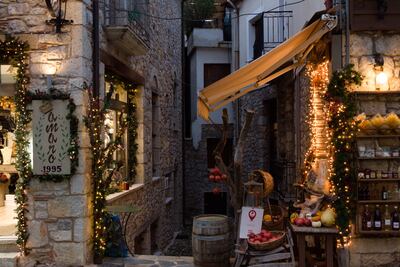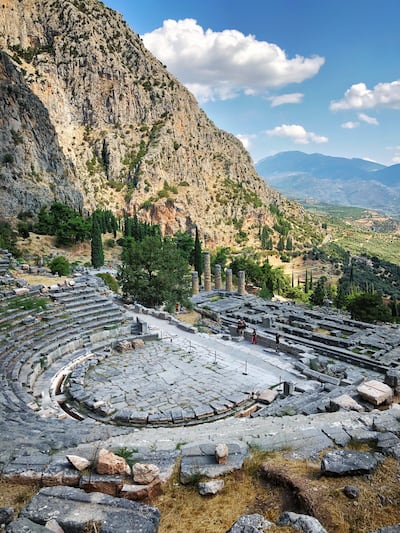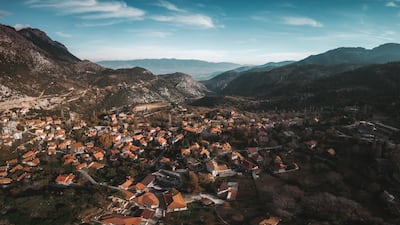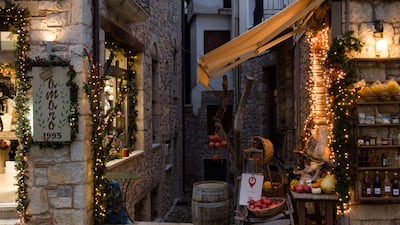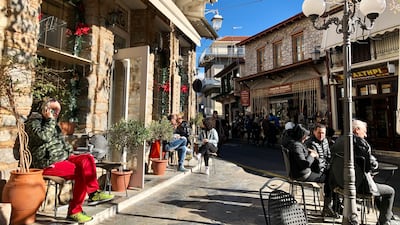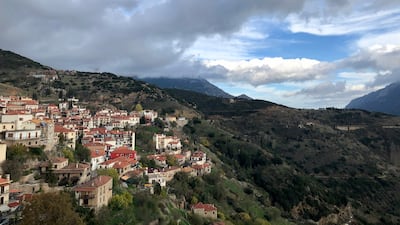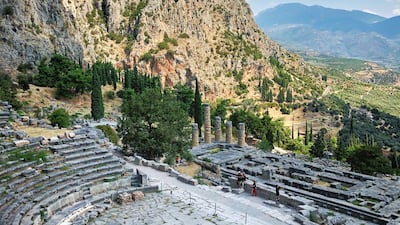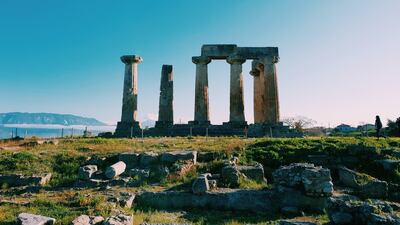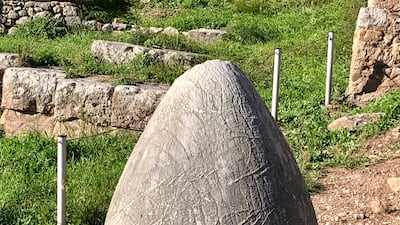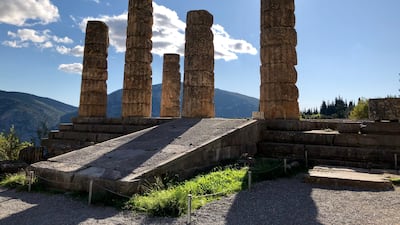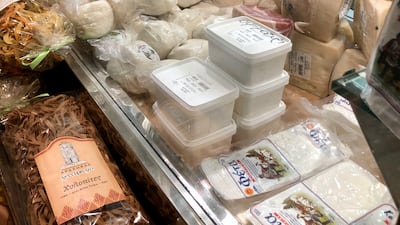It’s raining sunlight on the Greek mountain village of Arachova. The winter sun pours through breaks in the grey, rolling clouds and creates a spotlight effect on the wild, green valley below.
More Alpine than Aegean, Arachova stands apart from Greece’s better known, and sometimes overrun, island destinations. It is close to the ski resorts of Gerontovrachos, Kelaria and Fterolakka — some of the best places for winter sports in central Greece — and is a mere two-hour drive north-west of Athens, meaning the village is assured of year-round business.
Having guaranteed custom is a mixed blessing for those coming here to enjoy a relaxing winter break. Arachova, with its somewhat fairy-tale atmosphere, is well set up for tourism. There is plenty of accommodation, a wealth of tavernas and traditional coffee shops, or kafenia, and transport to nearby Delphi, a Unesco World Heritage archaeological site.
On the other hand, Arachova’s prices reflect the fact that there is little need for anyone to hustle for custom. The 15-minute bus ride to Delphi is a few euros but a taxi there is €15 ($15). A backpackers’ paradise Arachova is not, but what the area has in terms of scenery, food and history makes it hard to beat.
The village runs east to west along Livadias Amfissas and a slow walk along the road is perfect for getting your bearings. At the eastern end of the village, in a fine neoclassical building, is the Ethnographic Museum. The museum preserves the town’s strong rural culture, particularly its traditional crafts — examples of which can be bought at shops up and down the length of the street.
Behind the museum is an 18th-century clock tower perched on top of a small, rocky hill that offers dramatic views over the valley below. It’s a romantic spot and couples can be seen silhouetted against the sunshine, which Greece often enjoys late into the winter.
Passing the Church of the Assumption of the Virgin Mary and walking west along the main street, foodies will be pleased to find plenty of shops selling local produce. A firm, cylindrical cheese called formaiella is everywhere and is often served grilled in the village’s tavernas. There are stacks of local honey, bags of homemade pasta, herbs and spices for sale. The ubiquitous Greek olive oil is here, as are woollen carpets, rugs and other textiles made in the local style.
Pushing on into the village, past busy cafes and tavernas, you’ll have plenty more of Arachova’s mountainous panoramas to enjoy. It’s here that the local bus service departs for Delphi, a major archaeological site just a few kilometres to the west.
Delphi is incomparable. Sprawling across the south-west slope of Mount Parnassus, this was where the ancient Greeks believed the centre of the world lay. The rocky omphalos, or "navel" of the world, is still here, as are the remains of Delphi’s temples, its stadium, gym, theatre and treasury.
This was also where the oracle — the high priestess of the god Apollo — sat, delivering her otherworldly prophecies that decided the fate of battles and kingdoms. Some scientists say these visions were caused by noxious gases rising from a chasm beneath the Temple of Apollo, but standing on these slopes, it is more compelling to imagine the ancient gods deciding the fate of their unfortunate subjects.
Delphi can be a steep hike, but the huge site is a treasure trove of knowledge about the ancient Greeks. The museum at the foot of the sanctuary is a mine of information, and the whole site itself is sometimes free to enter — like all Greek archaeological sites, it is free on the first Sunday of the month during winter and spring.
The abundance of fresh air will make you hungry, putting you in the perfect position to try the local cuisine, which owes more to the mountains than to the sea. Back in Arachova, a brisk uphill walk on the edge of town will take you to Kaplanis taverna.
You can try the grilled formaiella cheese or a softer, tangier variety called opsimotiri, which goes well with the restaurant's roasted rooster and local pasta. Aside from Kaplanis’s must-try beetroot and garlic starter is kokoretsi — a dish of seasoned offal wrapped in lamb or goat intestines and grilled on a horizontal skewer. A firm favourite in Turkey, Greece and the Balkans, kokoretsi should not be passed up and Kaplanis does it to perfection.
Kaplanis also gets brownie points for holding on to the Greek tradition of giving its customers a free dessert after the main course — usually yoghurt with honey or glyko tou koutaliou (aka spoon sweets, which are all served with the magic word kerasma, or my treat).
Greece revels in its reputation as a sun-and-sand destination. But with places like Arachova within striking distance of Athens (itself served by direct flights from Abu Dhabi and Dubai), there’s no reason to put off your next Hellenic voyage until the summer rolls around again. And, if anyone asks why you’re going to Greece in the dead of winter, just tell them the oracle sent you.
Company%C2%A0profile
%3Cp%3E%3Cstrong%3ECompany%20name%3A%20%3C%2Fstrong%3Eamana%3Cbr%3E%3Cstrong%3EStarted%3A%20%3C%2Fstrong%3E2010%3Cbr%3E%3Cstrong%3EFounders%3A%3C%2Fstrong%3E%20Karim%20Farra%20and%20Ziad%20Aboujeb%3Cbr%3E%3Cstrong%3EBased%3A%20%3C%2Fstrong%3EUAE%3Cbr%3E%3Cstrong%3ERegulator%3A%20%3C%2Fstrong%3EDFSA%3Cbr%3E%3Cstrong%3ESector%3A%20%3C%2Fstrong%3EFinancial%20services%3Cbr%3E%3Cstrong%3ECurrent%20number%20of%20staff%3A%20%3C%2Fstrong%3E85%3Cbr%3E%3Cstrong%3EInvestment%20stage%3A%20%3C%2Fstrong%3ESelf-funded%3Cbr%3E%3C%2Fp%3E%0A
Classification of skills
A worker is categorised as skilled by the MOHRE based on nine levels given in the International Standard Classification of Occupations (ISCO) issued by the International Labour Organisation.
A skilled worker would be someone at a professional level (levels 1 – 5) which includes managers, professionals, technicians and associate professionals, clerical support workers, and service and sales workers.
The worker must also have an attested educational certificate higher than secondary or an equivalent certification, and earn a monthly salary of at least Dh4,000.
CHATGPT%20ENTERPRISE%20FEATURES
%3Cp%3E%E2%80%A2%20Enterprise-grade%20security%20and%20privacy%3C%2Fp%3E%0A%3Cp%3E%E2%80%A2%20Unlimited%20higher-speed%20GPT-4%20access%20with%20no%20caps%3C%2Fp%3E%0A%3Cp%3E%E2%80%A2%20Longer%20context%20windows%20for%20processing%20longer%20inputs%3C%2Fp%3E%0A%3Cp%3E%E2%80%A2%20Advanced%20data%20analysis%20capabilities%3C%2Fp%3E%0A%3Cp%3E%E2%80%A2%20Customisation%20options%3C%2Fp%3E%0A%3Cp%3E%E2%80%A2%20Shareable%20chat%20templates%20that%20companies%20can%20use%20to%20collaborate%20and%20build%20common%20workflows%3C%2Fp%3E%0A%3Cp%3E%E2%80%A2%20Analytics%20dashboard%20for%20usage%20insights%3C%2Fp%3E%0A%3Cp%3E%E2%80%A2%20Free%20credits%20to%20use%20OpenAI%20APIs%20to%20extend%20OpenAI%20into%20a%20fully-custom%20solution%20for%20enterprises%3C%2Fp%3E%0A
More on Quran memorisation:
What vitamins do we know are beneficial for living in the UAE
Vitamin D: Highly relevant in the UAE due to limited sun exposure; supports bone health, immunity and mood.
Vitamin B12: Important for nerve health and energy production, especially for vegetarians, vegans and individuals with absorption issues.
Iron: Useful only when deficiency or anaemia is confirmed; helps reduce fatigue and support immunity.
Omega-3 (EPA/DHA): Supports heart health and reduces inflammation, especially for those who consume little fish.
The specs
Engine: 3.6 V6
Transmission: 8-speed auto
Power: 295bhp
Torque: 353Nm
Price: Dh155,000
On sale: now
Kandahar%20
%3Cp%3E%3Cstrong%3EDirector%3A%3C%2Fstrong%3E%20Ric%20Roman%20Waugh%3C%2Fp%3E%0A%3Cp%3E%3Cstrong%3EStars%3A%C2%A0%3C%2Fstrong%3EGerard%20Butler%2C%20Navid%20Negahban%2C%20Ali%20Fazal%3C%2Fp%3E%0A%3Cp%3E%3Cstrong%3ERating%3A%3C%2Fstrong%3E%202.5%2F5%3C%2Fp%3E%0A
Director: Romany Saad
Starring: Mirfat Amin, Boumi Fouad and Tariq Al Ibyari
SPECS
%3Cp%3E%0D%3Cstrong%3EEngine%3A%3C%2Fstrong%3E%204.0-litre%20twin-turbo%20V8%0D%3Cbr%3E%3Cstrong%3EPower%3A%3C%2Fstrong%3E%20750hp%20at%207%2C500rpm%0D%3Cbr%3E%3Cstrong%3ETorque%3A%3C%2Fstrong%3E%20800Nm%20at%205%2C500rpm%0D%3Cbr%3E%3Cstrong%3ETransmission%3A%3C%2Fstrong%3E%207%20Speed%20dual-clutch%20auto%0D%0D%3Cbr%3E%3Cstrong%3ETop%20speed%3A%3C%2Fstrong%3E%20332kph%0D%3Cbr%3E%3Cstrong%3EFuel%20consumption%3A%3C%2Fstrong%3E%2012.2L%2F100km%0D%3Cbr%3E%3Cstrong%3EOn%20sale%3A%20%3C%2Fstrong%3EYear%20end%0D%3Cbr%3E%3Cstrong%3EPrice%3A%3C%2Fstrong%3E%20From%20Dh1%2C430%2C000%20(coupe)%3B%20From%20Dh1%2C566%2C000%20(Spider)%3C%2Fp%3E%0A
The specs: 2018 Chevrolet Trailblazer
Price, base / as tested Dh99,000 / Dh132,000
Engine 3.6L V6
Transmission: Six-speed automatic
Power 275hp @ 6,000rpm
Torque 350Nm @ 3,700rpm
Fuel economy combined 12.2L / 100km
Electric scooters: some rules to remember
- Riders must be 14-years-old or over
- Wear a protective helmet
- Park the electric scooter in designated parking lots (if any)
- Do not leave electric scooter in locations that obstruct traffic or pedestrians
- Solo riders only, no passengers allowed
- Do not drive outside designated lanes
Jiu-jitsu calendar of events for 2017-2018:
August 5:
Round-1 of the President’s Cup in Al Ain.
August 11-13:
Asian Championship in Vietnam.
September 8-9:
Ajman International.
September 16-17
Asian Indoor and Martial Arts Games, Ashgabat.
September 22-24:
IJJF Balkan Junior Open, Montenegro.
September 23-24:
Grand Slam Los Angeles.
September 29:
Round-1 Mother of The Nation Cup.
October 13-14:
Al Ain U18 International.
September 20-21:
Al Ain International.
November 3:
Round-2 Mother of The National Cup.
November 4:
Round-2 President’s Cup.
November 10-12:
Grand Slam Rio de Janeiro.
November 24-26:
World Championship, Columbia.
November 30:
World Beach Championship, Columbia.
December 8-9:
Dubai International.
December 23:
Round-3 President’s Cup, Sharjah.
January 12-13:
Grand Slam Abu Dhabi.
January 26-27:
Fujairah International.
February 3:
Round-4 President’s Cup, Al Dhafra.
February 16-17:
Ras Al Khaimah International.
February 23-24:
The Challenge Championship.
March 10-11:
Grand Slam London.
March 16:
Final Round – Mother of The Nation.
March 17:
Final Round – President’s Cup.
Who has lived at The Bishops Avenue?
- George Sainsbury of the supermarket dynasty, sugar magnate William Park Lyle and actress Dame Gracie Fields were residents in the 1930s when the street was only known as ‘Millionaires’ Row’.
- Then came the international super rich, including the last king of Greece, Constantine II, the Sultan of Brunei and Indian steel magnate Lakshmi Mittal who was at one point ranked the third richest person in the world.
- Turkish tycoon Halis Torprak sold his mansion for £50m in 2008 after spending just two days there. The House of Saud sold 10 properties on the road in 2013 for almost £80m.
- Other residents have included Iraqi businessman Nemir Kirdar, singer Ariana Grande, holiday camp impresario Sir Billy Butlin, businessman Asil Nadir, Paul McCartney’s former wife Heather Mills.
Hunting park to luxury living
- Land was originally the Bishop of London's hunting park, hence the name
- The road was laid out in the mid 19th Century, meandering through woodland and farmland
- Its earliest houses at the turn of the 20th Century were substantial detached properties with extensive grounds
Infiniti QX80 specs
Engine: twin-turbocharged 3.5-liter V6
Power: 450hp
Torque: 700Nm
Price: From Dh450,000, Autograph model from Dh510,000
Available: Now
AGL AWARDS
Golden Ball - best Emirati player: Khalfan Mubarak (Al Jazira)
Golden Ball - best foreign player: Igor Coronado (Sharjah)
Golden Glove - best goalkeeper: Adel Al Hosani (Sharjah)
Best Coach - the leader: Abdulaziz Al Anbari (Sharjah)
Fans' Player of the Year: Driss Fetouhi (Dibba)
Golden Boy - best young player: Ali Saleh (Al Wasl)
Best Fans of the Year: Sharjah
Goal of the Year: Michael Ortega (Baniyas)
FROM%20THE%20ASHES
%3Cp%3EDirector%3A%20Khalid%20Fahad%3C%2Fp%3E%0A%3Cp%3EStarring%3A%20Shaima%20Al%20Tayeb%2C%20Wafa%20Muhamad%2C%20Hamss%20Bandar%3C%2Fp%3E%0A%3Cp%3ERating%3A%203%2F5%3C%2Fp%3E%0A
Who's who in Yemen conflict
Houthis: Iran-backed rebels who occupy Sanaa and run unrecognised government
Yemeni government: Exiled government in Aden led by eight-member Presidential Leadership Council
Southern Transitional Council: Faction in Yemeni government that seeks autonomy for the south
Habrish 'rebels': Tribal-backed forces feuding with STC over control of oil in government territory
SPECS
%3Cp%3E%3Cstrong%3EEngine%3A%3C%2Fstrong%3E%20Dual%20electric%20motors%20with%20102kW%20battery%20pack%3C%2Fp%3E%0A%3Cp%3E%3Cstrong%3EPower%3A%20%3C%2Fstrong%3E570hp%3C%2Fp%3E%0A%3Cp%3E%3Cstrong%3ETorque%3A%3C%2Fstrong%3E%20890Nm%3C%2Fp%3E%0A%3Cp%3E%3Cstrong%3ERange%3A%3C%2Fstrong%3E%20Up%20to%20428km%3C%2Fp%3E%0A%3Cp%3E%3Cstrong%3EOn%20sale%3A%3C%2Fstrong%3E%20Now%3C%2Fp%3E%0A%3Cp%3E%3Cstrong%3EPrice%3A%20%3C%2Fstrong%3EFrom%20Dh1%2C700%2C000%3C%2Fp%3E%0A
UAE cricketers abroad
Sid Jhurani is not the first cricketer from the UAE to go to the UK to try his luck.
Rameez Shahzad Played alongside Ben Stokes and Liam Plunkett in Durham while he was studying there. He also played club cricket as an overseas professional, but his time in the UK stunted his UAE career. The batsman went a decade without playing for the national team.
Yodhin Punja The seam bowler was named in the UAE’s extended World Cup squad in 2015 despite being just 15 at the time. He made his senior UAE debut aged 16, and subsequently took up a scholarship at Claremont High School in the south of England.
THE SPECS
Engine: 6.75-litre twin-turbocharged V12 petrol engine
Power: 420kW
Torque: 780Nm
Transmission: 8-speed automatic
Price: From Dh1,350,000
On sale: Available for preorder now
FIXTURES
All kick-off times UAE ( 4 GMT)
Friday
Sevilla v Levante (midnight)
Saturday
Athletic Bilbao v Real Sociedad (7.15pm)
Eibar v Valencia (9.30pm)
Atletico Madrid v Alaves (11.45pm)
Sunday
Girona v Getafe (3pm)
Celta Vigo v Villarreal (7.15pm)
Las Palmas v Espanyol (9.30pm)
Barcelona v Deportivo la Coruna (11.45pm)
Monday
Malaga v Real Betis (midnight)
DEADPOOL & WOLVERINE
Starring: Ryan Reynolds, Hugh Jackman, Emma Corrin
Director: Shawn Levy
Rating: 3/5
UK’s AI plan
- AI ambassadors such as MIT economist Simon Johnson, Monzo cofounder Tom Blomfield and Google DeepMind’s Raia Hadsell
- £10bn AI growth zone in South Wales to create 5,000 jobs
- £100m of government support for startups building AI hardware products
- £250m to train new AI models
More from Neighbourhood Watch
Scoreline
Liverpool 3
Mane (7'), Salah (69'), Firmino (90')
Bournemouth 0
MOTHER%20OF%20STRANGERS
%3Cp%3EAuthor%3A%20Suad%20Amiry%3Cbr%3EPublisher%3A%20Pantheon%3C%2Fp%3E%0A%3Cp%3EPages%3A%20304%3Cbr%3EAvailable%3A%20Now%3C%2Fp%3E%0A
Skoda Superb Specs
Engine: 2-litre TSI petrol
Power: 190hp
Torque: 320Nm
Price: From Dh147,000
Available: Now
Engine: 5.6-litre V8
Transmission: seven-speed automatic
Power: 400hp
Torque: 560Nm
Price: Dh234,000 - Dh329,000
On sale: now
